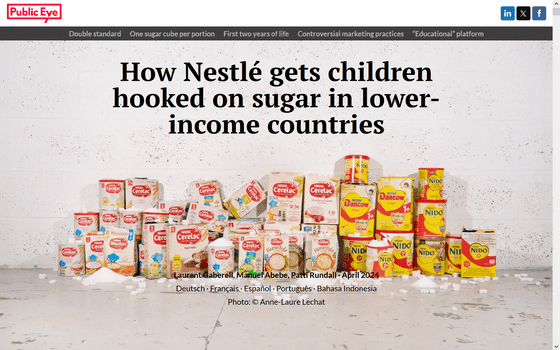How Nestlé is sugar-dipping children in low-income countries

by
Swiss-based food manufacturer Nestlé sells baby food with large amounts of added sugar to low- and middle-income countries, claiming it is key to supporting healthy early childhood development, yet sells these products without added sugar in Switzerland. Public Eye, a Swiss-based non-governmental organization that analyzes the impact of Swiss companies in poor countries, has criticized Nestlé for its double standards and marketing strategies.
How Nestlé gets children hooked on sugar in lower-income countries
https://stories.publiceye.ch/nestle-babies/#group-section-First-two-years-of-life-Mwlq7k1QJj

Nestlé has baby food brands such as Seralec and Nido that it promotes with the goal of helping children live healthier lives, and these brands have given it 20% of the baby food market share, according to Public Eye.
However, it turns out there are clear differences between countries in the amount of sugar used in these branded products.
Public Eye said that while in Switzerland, where Nestlé is headquartered, its infant cereal and formula brands have no added sugar, most Cerelac and Nido products sold in low-income countries contain added sugar, often in high concentrations.
For example, biscuit-flavored cereal, which is suitable for babies aged six months and older, is sugar-free in Switzerland, but in Senegal and South Africa the same flavored cereal contains six grams of added sugar per serving.

by
In its main European markets of Germany, France and the UK, as well as Switzerland, all Nestlé milks for infants aged 12-36 months are sugar-free. As in Switzerland, infant cereals for infants aged six months contain no added sugar, although some cereals for infants over one year old contain added sugar.
The tendency for sugar to be included is particularly pronounced in low- and middle-income countries, where the sugar content per serving of the same product ranges from 6.0 grams in Thailand, 5.2 grams in Ethiopia, 4.0 grams in South Africa, 2.7 grams in Pakistan, 2.2 grams in India and 1.6 grams in Bangladesh.

Commenting on Public Eye's findings, Nigel Rollins, a scientist at the World Health Organization (WHO), said: 'The willingness to add sugar in low-resource settings raises both public health and ethical concerns. Some manufacturers are accustoming children to a certain level of sugar from an early age, potentially leading them to prefer sugary products, which is simply not right.'
Nestle's double standards are also evident in its marketing strategy. In Brazil, where Nido holds the second-largest baby food market share, Nestle warns on its website that 'children prefer sweet flavors and may be more likely to consume sweet foods in the future, so it is ideal to avoid sweet foods during childhood,' demonstrating its concern for children's health and diet. On the other hand, most Central American countries continue to include more than one sugar cube in milk for children over one year old, and even use influencers to promote such baby foods.

by Nestlé
In Indonesia in particular, Nestlé conducted a campaign aimed at supporting children over the age of one, with around 2 million mothers promoting Nestlé products. These products are advertised as beneficial for the health of babies, but they still contain sugar.
Karen Hoffman, a professor of public health and a licensed pediatrician, said, 'There is no justification for adding sugar to baby food. What Nestle is doing is a form of colonization and should not be tolerated.' Rodrigo Vianna, a professor of nutrition and epidemiologist, said, 'Sugar is highly addictive and should not be added to foods given to infants and young children. Children become accustomed to the sweet taste and start looking for more sugary foods, starting a negative cycle that increases the risk of nutritional disorders in adulthood. They may suffer from chronic diseases such as obesity, diabetes, and high blood pressure.' He lamented the current situation in areas where children are forced to ingest sugar.
When asked by Public Eye, Nestlé did not provide any specific answers, saying only that 'over the last decade, we have reduced the total amount of added sugars by 11% globally and we are committed to further reducing levels of added sugar without compromising on quality, safety or taste.'
Public Eye said: 'There is no justification for the double standards highlighted by this investigation. If Nestlé truly wants to act responsibly, it must follow WHO recommendations and guidelines to end added sugar in baby food and stop over-sweetening babies and young children, regardless of their country of birth.'
Related Posts:
in Food, Posted by log1p_kr







